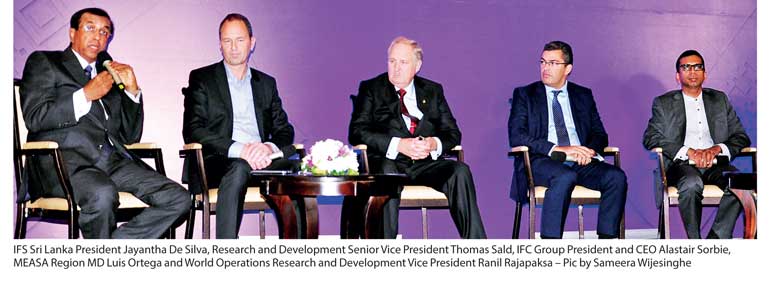Wednesday Feb 25, 2026
Wednesday Feb 25, 2026
Tuesday, 14 November 2017 00:00 - - {{hitsCtrl.values.hits}}

By Shannon Jayawardena
IFS Sri Lanka celebrating 20 years is now focusing to improve software innovation in aviation, food and process manufacturing, garments and retail sectors aiming to enhance the company’s global product development work.
The company, first established in 1997, was then an IT enabling industry, and has now grown in success with many of Sri Lanka’s top companies including Singer, Toyota, Sri Lanka Telecom, Litro Gas, Odel, Akbar Brothers, DSI Samson Group, and Dankotuwa Porcelain as customers of its enterprise software and is recognised as the most recommended supplier in the sector.
While the company is an extension of IFS Sweden, the local team has been key to IFS’s global success with 60% of the product development done in Sri Lanka. Many global initiatives such as the IFS Academy, IFS Labs for innovation, the global support centre as well as important aspects of product development are all run from the company’s Sri Lankan based offices; Colombo and Kandy.
As Sri Lanka has a strong agricultural sector, IFS has targeted the coconut, tea sectors as well as apparel, hence it has developed the best tea blending solution in the world as well as the best garment solutions, the company said. Thereby customers locally and globally use IFS solutions to manufacture and distribute goods, maintain assets and manage service-focused operations.
“We started here 20 years ago and were a small company of $20 million back then and today it is a $440 million company. We have 3,500 staff across the world and to have over 1,000 of that staff in Sri Lanka means that we’re striving here,” IFS CEO Alastair Sorbie told reporters.
“The importance of building the best team of industry experts is no more pronounced than in Sri Lanka – not only is Sri Lanka home to the largest number of IFS employees but the local team is also key to the success of so many fundamental parts of our global business,” he added.
The company also offers a unique value proposition to its staff that helps them retain young talent. The organisation promotes creativity, innovation and freedom of new thoughts, empowers people to pursue their ideas and provide exposure to technology and the business domain.
IFS Sri Lanka President and CEO Jayantha De Silva emphasising on the operation expansion over the last two decades stated, “We are now a complete Resource Centre catering globally and have achieved significant milestones within the ICT industry as we celebrate two decades of excellence. We can say we are different in many ways. The experience and knowledge together have stretched us to diversified avenues.”
De Silva also said, “The Sales and Consulting unit for IFS in South Asia operates from its Colombo office and markets, implements and supports IFS Applications in companies within the South Asia region. The company currently supports more than 120 companies across Sri Lanka, India, Bangladesh, Pakistan, Thailand, Seychelles and Uganda.”
“IFS has been a key player in driving the IT/ BPO industry in Sri Lanka towards building capacity. We pioneered many innovative concepts in the industry and initiated concepts such as the ‘scholarship scheme’ offered to A/L students with the objective of supporting the industry build capacity. To date over 300 scholarships have been awarded and it has now become an industry standard.”
IFS offers full scholarships to students interested in the field and are closely linked with many universities. They teach co-curriculum subjects in many leading universities and take part in joint research to help build young talent. In 2017 IFS increased people working in R&D by 16%.
IFS Sri Lanka Chief Operating Officer Ranil Rajapakse said, “The more people we have coming into the industry is better not only for the company but also for the industry as a whole. And if you look at it from a country perspective I think this relationship with the industry and universities are also important because as a country if we want to achieve more we need to take ourselves to the next level, in terms of new product innovations.”